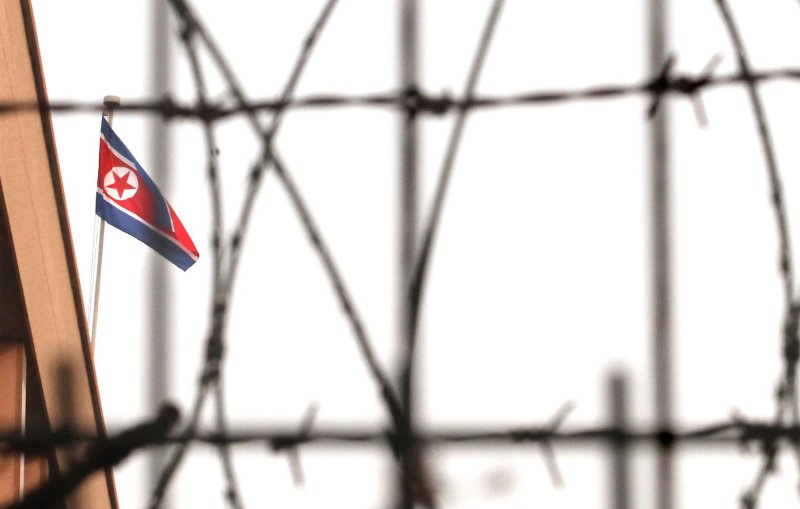The North Korean national flag flies over its embassy in Beijing. File/UPI/Stephen Shaver |
License Photo
BEIJING, March 19 (UPI) -- China added its voice to international apprehension over North Korea's announcement that it will launch a satellite next month.
A statement from the Chinese Foreign Ministry said Vice Foreign Minister Zhang Zhijun met with North Korean Ambassador Ji Jae Ryong "to express China's worry over the matter," China's state-run news agency Xinhua reported.
Zhang said China has noted North Korea's intentions to launch a satellite but Beijing also noted reaction from the international community, Xinhua said.
"China believes it is the common obligation and in common interests of all parties concerned to maintain peace and stability on the Korean Peninsula and northeast Asia, the foreign ministry statement said.
"We sincerely hope parties concerned stay calm, exercise restraint and avoid escalation of tension that may lead to a more complicated situation," Zhang was quoted as saying.
Last week North Korea announced the intended launch of the "Earth-observation" satellite called Kwangmyongsong-3, saying it will use a long-range rocket.
The launch is to mark the 100th birthday on April 15 of the late Kim Il Sung, founder of North Korea and grandfather of Kim Jong Un, the new leader of North Korea. Kim Jong Un, 28, came to power in December after the death of his father Kim Jong Il.
The launch will, if it goes ahead, be the Pyongyang's second attempt to put a satellite into orbit after what most observers said was a botched first attempt in 2009.
U.S. and South Korean officials say the new launch is a thinly disguised military test.
U.S. Secretary of State Hillary Clinton, in a statement, said the launch would violate U.N. Security Council resolutions that prohibit North Korea from conducting launches using ballistic missile technology.
"North Korea's announcement that it plans to conduct a missile launch in direct violation of its international obligations is highly provocative," Clinton said.
A U.S. State Department spokeswoman warned that last month's agreement by Kim Jong Un and the United States to deliver food aid to the impoverished country would be put on hold.
'I think we're going to take a pause here and see what happens," State Department spokeswoman Victoria Nuland said. "A North Korean launch of a satellite would be highly provocative."
Under the food aid deal, Pyongyang would stop nuclear tests, long-range missile launches and uranium enrichment work in exchange for 264,500 tons of food aid.
"Frankly, if they were to go forward with this launch, it's very hard to imagine how we would be able to move forward with a regime whose word we have no confidence in and who has egregiously violated its international commitments," Nuland said.
Concern over the launch has been expressed also by South Korea, Russia, Japan, Britain and France, as well as U.N. Secretary-General Ban Ki-moon, a former South Korean foreign minister.
The first satellite launch in April 2009 aboard a three-stage rocket appeared to fall far short of international expectations, although claimed a success by Seoul, a report by The New York Times said at the time.
Military and private experts said, after reviewing detailed tracking data, that the missile and payload fell into the South China Sea off North Korea's coast, the Times said.
But the North Korean government portrayed the launch a success, bragging that the payload was broadcasting patriotic tunes from space, the Times reported.
"It's got to be embarrassing," said Geoffrey E. Forden, a missile expert at the Massachusetts Institute of Technology. "I can imagine heads flying if the 'Dear Leader' (Kim Jong Ill) finds out the satellite didn't fly into orbit."
Nonetheless, the launch outraged many countries, in particular Japan and South Korea, and led the Security Council to go into emergency session, the Times said.





